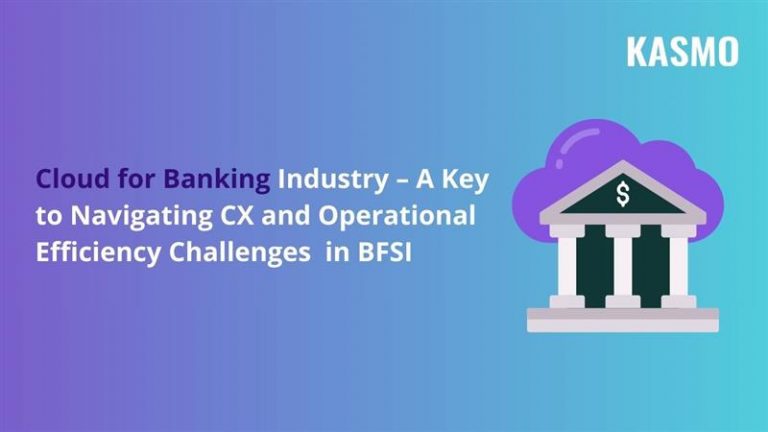Introduction
Fortune 500 financial services companies can generate $60-$80 billion by 2030 after adopting cloud technology. – A McKinsey Analysis.
Financial institutions are gravitating towards technologies and solutions that can help them achieve their targets and maintain good customer service. However, they are still apprehensive about cloud migration, as it is not generally easy and secure. Adopting Snowflake AI Data Cloud for the banking industry will help them protect sensitive data and achieve faster results while personalizing customer service for their clients.
According to a survey by McKinsey, 54% of financial institutions are expected to shift towards cloud-first technology over the next five years. The financial industry is looking forward to creating data strategies that can help them achieve success sustainably even in dynamic conditions.
This blog will explore how the cloud for the banking industry can guide financial leaders to make the correct decisions to help them achieve their targets and retain customers. You will also explore the importance of cloud banking and how Snowflake can help financial leaders navigate complex challenges.
A Brief Overview of Cloud Banking
Cloud banking can be defined as the process by which the banking industry provides services through the Internet. This process utilizes cloud computing technologies such as remote servers, data centers, and Software-as-a-Service (SaaS). This approach facilitates financial institutions to provide on-demand, scalable services, improving accessibility and experience for customers.
Banking institutions that implement cloud technologies enhance the customer experience by enabling seamless digital transactions. For example, when a customer wants to purchase a product online, financial services leveraging cloud solutions facilitate these transactions securely and efficiently.
Implementing cloud solutions allows financial services companies to save costs. These cloud solutions automate remote work tasks and enable the high computational power needed for AI, machine learning, and Internet of Things (IoT) solutions.
Cloud platforms are rapidly helping banks innovate and meet evolving business needs. Leveraging cloud for the banking industry facilitates these institutions to scale, drive innovation, and remain competitive in a rapidly changing market.
Importance of the Cloud for the Banking Industry
Cloud banking has brought rapid transformation for customers carrying out transactions regularly. Through a cloud banking app, they can now buy groceries, pay bills, and carry out different purchases easily and securely. This level of integration has made daily activities faster, more efficient, and more accessible.
Cloud for the banking industry helps financial services companies gather customer data without violating or compromising any sensitive data. With cloud banking financial services companies can now enhance data security, drive product innovation, and integrate advanced technologies like Artificial Intelligence (AI) and Machine Learning (ML).
These tools automate routine tasks and facilitate banks to create more personalized services, optimize operations, and stay informed of future market trends. Thus, cloud banking plays a vital role in transforming the future of banking industry.
Benefits of Implementing the Cloud for the Banking Industry
As financial institutions accelerate their digital transformation efforts, many are turning to cloud banking to deliver enhanced products and services and gain significant operational benefits.
Reduces Cost
Shifting to the cloud will allow banks to significantly reduce costs related to data storage and analysis. To date, banks have been maintaining extensive on-premises infrastructure for storing detailed customer records. These on-premise infrastructures are rigid, and cost-effective, and financial services have to deal with downtime.
By leveraging the cloud for the banking industry, financial firms can get a flexible, pay-as-you-go solution that can be scaled according to business needs, without dealing with downtime errors. Cloud solutions also enable financial institutions to optimize costs and meet regulatory requirements for data retention.
Enhances Data Security and Compliance
Data security is a top priority for banks, as they harbor large volumes of sensitive customer data. Leveraging cloud for banking industry will strengthen security, by providing advanced protection measures, such as encryption, fraud detection, and real-time monitoring. Cloud solutions also help banks stay compliant with evolving industry regulations by offering built-in tools for data privacy and reporting. Many cloud platforms also ensure swift recovery if any financial firm faces any operational disruptions.
Facilitates Financial Institutions Leverage AI
Implementing cloud for banking industry, facilitates financial firms to harness the power of Artificial Intelligence (AI) across various functions. By storing customer data in the cloud, banks can leverage AI to gain valuable insights into customer behavior. This helps financial leaders take data-driven decisions easily.
AI-powered tools like chatbots and virtual assistants are transforming customer service, by automating intelligent interactions in natural language that helps customers open accounts, transfer funds, and apply for loans or credit cards more efficiently.
Improves Faster Deployment of Services
The dynamic nature of cloud banking enables financial firms to rapidly develop and deploy new applications and services. With a wide range of tools and resources available in cloud technologies, financial institutions can quickly address customer needs without delaying them.
Cloud technologies have updated and flexible infrastructure which helps firms deploy new services and features within seconds, where it would have taken traditional, on-premise architecture hours. This enhances financial firms optimize their customer experience.
Key Challenges Faced by Financial Services Company
Without adopting cloud solutions, financial firms are facing major challenges that are creating hindrances to provide customer service and achieving operational efficiency. Let’s look at some of these challenges:
- Siloed and Fragmented Data Systems: Many banks face challenges in breaking down data silos and segregating fragmented data. This fragmentation and silos make it difficult to consolidate customer data, resulting in inconsistent customer service across channels and departments.
- Inefficient Data Access and Velocity: Fragmented systems lead to delays in accessing and analyzing customer data, hindering the ability to deliver timely and tailored customer interactions. Delayed data insights prevent financial institutions from taking on opportunities to respond quickly to customer needs.
- Compliance and Data Governance Issues: Inconsistent data governance, authentication processes, and access controls increase compliance risks. Banks face difficulties in ensuring secure and compliant access to sensitive customer data, resulting in data security breaches and regulatory penalties.
- Missed Opportunities: Due to fragmented data and slow analytics, financial institutions miss opportunities to engage customers with the right offers at the right time. Without a comprehensive, real-time view of the customers, banks are unable to tailor services and products effectively.
How Snowflake AI Data Cloud Helps in Adopting Cloud for Banking Industry?
Snowflake’s robust data security and governance features help financial services organizations navigate the challenges of managing sensitive customers, and accounts, and assess risks. This ensures financial firms remain aligned with compliance and safeguarding privacy policies. With capabilities such as Dynamic Data Masking and end-to-end encryption, Snowflake protects critical information while allowing seamless, secure data sharing across multiple platforms.
Snowflake’s Global Data Clean Rooms also allow banks and other financial firms to collaborate with external partners securely, without exposing confidential customer data. This functionality promotes data sharing for joint initiatives while maintaining strict privacy controls.
Leveraging Snowflake Data Cloud for banking industry, helps financial institutions simplify their data architectures, making it easier to deploy AI solutions. These solutions also help optimize customer experiences, enhance risk management, and improve critical business workflows. With centralized data and AI-powered analytics, banks can provide personalized services, improve decision-making, and automate time-consuming tasks.
Snowflake Marketplace opens access to a rich array of third-party data providers, enabling financial firms to enhance their data insights. From collaborating with industry partners to integrating external datasets, Snowflake empowers financial institutions to address key business challenges and drive innovation.
Whether it’s simplifying data access, enhancing collaboration, or enabling AI deployment, leveraging Snowflake Data Cloud for banking industry provides financial leaders with the tools they require to streamline operations, secure sensitive data, and deliver more responsive, data-driven services to their customers.
Conclusion
By adopting cloud for banking industry, companies in the sector can enhance customer experience, improve operational efficiency, and foster innovation. Cloud banking provides financial institutions with the flexibility, scalability, and cost-saving opportunities they need to remain competitive. It also enables the deployment of advanced technologies like AI and machine learning, further enhancing product offerings and customer service. By shifting to cloud, banks can meet the increasing demands of consumers and provide personalized, seamless services, while reducing cost and maintaining operational efficiency.
Leveraging Snowflake AI Data Cloud offers a robust solution to financial institutions trying to navigate the challenges of cloud adoption. This cloud platform provides advanced data security, seamless collaboration, and AI-powered analytics. By centralizing data, improving governance, and offering secure data-sharing capabilities, Snowflake empowers banks to overcome data fragmentation, compliance risks, and missed opportunities. With its powerful suite of tools, Snowflake helps financial institutions achieve faster, smarter, and more secure cloud migration, enabling them to drive business growth.
Read how Kasmo helped a software development firm to have a seamless data migration experience with its expertise. Read now!



